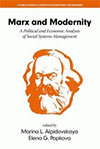
Marx and Modernity
A Political and Economic Analysis of Social Systems Management
Edited by:
Marina L. Alpidovskaya, Financial University
Elena G. Popkova, Plekhanov Russian University of Economics, Moscow, Russia
A volume in the series: Advances in Research on Russian Business and Management. Editor(s): Elena G. Popkova, RUDN University, Moscow.
Published 2019
May 5, 2018 marked the 200th anniversary of the birth of Karl Heinrich Marx, German scientist, philosopher, economist, and sociologist. His creative genius created a system-functional model of contemporary society, defined its socio-economic character, and formulated scientific and philosophical approaches for its cognition. Marx also developed methodological clues for identifying and substantiating the economic nature of phenomena, processes and the socio-economic relations that mediate them, which are of critical relevance today. Before Marx, political economy was an eclectic combination of separate theories and concepts espoused by various philosophers. Marx was able to transform the field into a coherent science with a single systemic approach.
Today, the generally recognized economic mainstream has no way of explaining in detail the causes of the ongoing global economic crisis. However, it is generally accepted that modern Marxist legacy researchers have advantages in their analyses. They believe that at the start of the 21st century capitalism does not tend to self-destruct. However, its failings are more and more clearly manifested. They believe that the capitalist system has not outlived its weaknesses, and the old bourgeois financiers have not been replaced, as was necessary, by a generation of new leaders armed with new methods of management and capable of coming up with solutions to current problems. The philosophical underpinnings of the capitalist economic system have laid a time bomb under the whole ideology of capitalism. Capitalism as a development system ceases to exist. The truth, which was found in the past writings of Marx, cannot be completely rejected, nor should it be venerated as a museum exhibit.
This book is aimed at reactivating fundamental political and economic studies on the rules and functioning of the global geo-economic system from the point of view of a modern interpretation of Karl Marx's concept of objective processes in the conditions of the current systemic crisis of capitalism.
CONTENTS
Introduction. PART I: THE RELEVANCE OF THE MARXIST METHODOLOGY. PART II: THE DIALECTICS OF THE MODERN MARXIST STUDIES. PART III: FROM CRISIS TO THE ECONOMY OF THE FUTURE. PART IV: THE SOCIO-ECONOMIC DEVELOPMENT AND MANAGEMENT OF MODERN ECONOMIC SYSTEMS.
-
Paperback978-1-64113-749-2
Web price: $62.04 (Reg. 72.99)
-
Hardcover978-1-64113-750-8
Web price: $89.24 (Reg. 104.99)
- eBook978-1-64113-751-5

- BUS069030 - BUSINESS & ECONOMICS: ECONOMICS: Theory
- BUS023000 - BUSINESS & ECONOMICS: Economic History
- POL042000 - POLITICAL SCIENCE: Political Ideologies: General
-
 Alternative Methods of Judging Economic Conflicts in the National Positive and Soft Law
Alternative Methods of Judging Economic Conflicts in the National Positive and Soft Law
-
 Economic and Legal Foundations of Modern Russian Society
A New Institutional Theory
Economic and Legal Foundations of Modern Russian Society
A New Institutional Theory
-
 Marketing of Healthcare Organizations
Technologies of Public-Private Partnership
Marketing of Healthcare Organizations
Technologies of Public-Private Partnership
-
 Meta-Scientific Study of Artificial Intelligence
Meta-Scientific Study of Artificial Intelligence
-
 Reimagining Socioeconomic Development of Russia
New Directions, Theory, and Practice
Reimagining Socioeconomic Development of Russia
New Directions, Theory, and Practice
-
 The Transformation of Social Relationships in Industry 4.0
Economic Security and Legal Prevention
The Transformation of Social Relationships in Industry 4.0
Economic Security and Legal Prevention
-
 Tracks to Infinity, The Long Road to Justice
The Peter McLaren Reader, Volume II
Tracks to Infinity, The Long Road to Justice
The Peter McLaren Reader, Volume II

